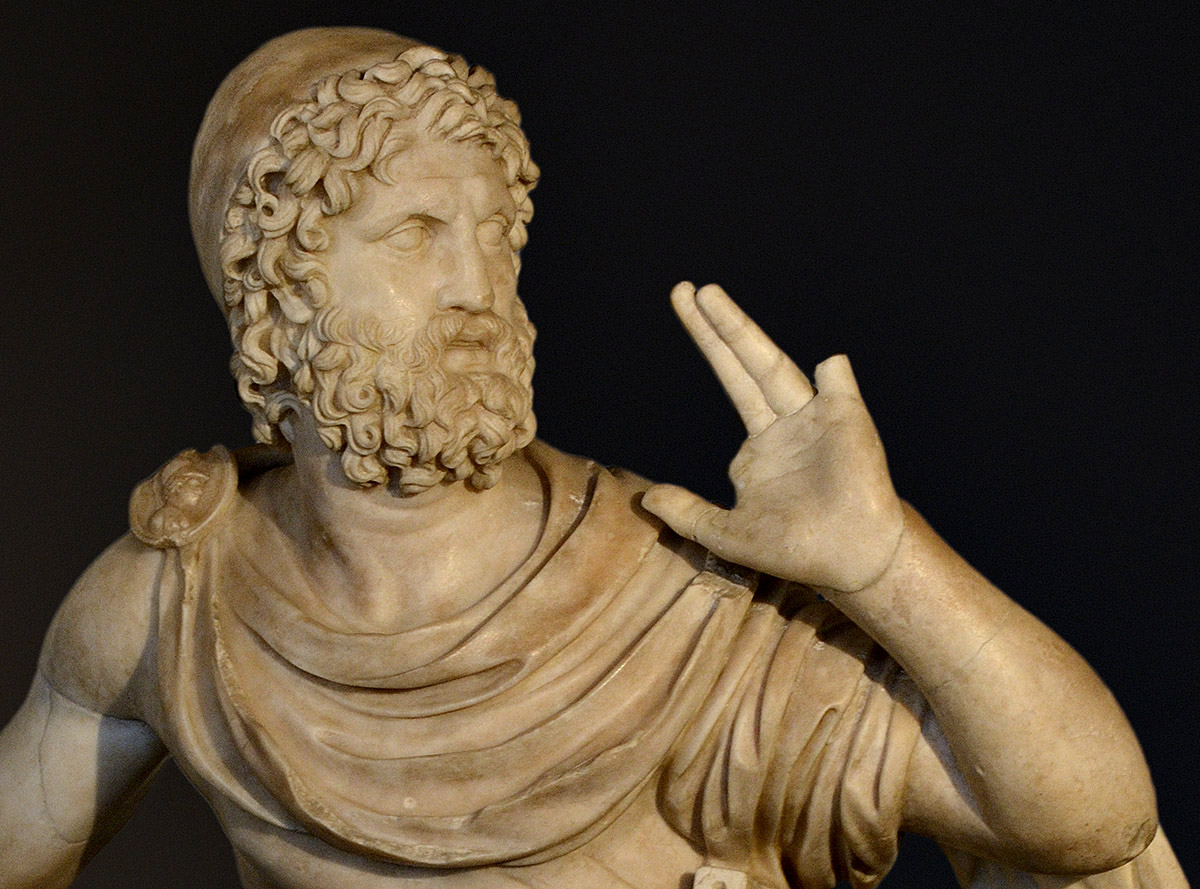The DECODER series — to which SEMIOVOX has invited our semiotician colleagues from around the world to contribute — explores fictional semiotician-esque action as depicted in books, movies, TV shows, etc.
A fictional character inspiring the crucial skill a semiotician must exemplify? As Thomas Sebeok and Jean Umiker-Sevbeok made clear in their essay “You Know My Method: a Juxtaposition of Charles S. Peirce and Sherlock Holmes,”[1] the skill is abduction — and Holmes is its exemplary fictional practitioner.
Indebted though I am to Sebeok’s work, however, my abductive inspiration is not a clever detective facing the anomalies of crime, but a Greek hero facing dangerous travel via a semiotic toolbox so rich as to set him apart from his tribal constraints. I believe that even today, when fictional characters face the ultimate challenge of deciphering extra-terrestrial communication, Odysseus continues to be the primary source of inspiration for the would-be abductionists of a global world deceivingly presenting itself as homogeneous.
“Sing in me, Muse, and through me tell the story of that crafty man”… could be one translation to the famous πολύτροπος (polutropos) epithet found in the first line of Homer’s Odyssey. But so could shifty, complicated, tricky, resilient, wily, cunning, adaptive, deceitful, of many ways, shrewd, and lying. These and others, it has been argued, are adequate translations of Odysseus’s defining characteristic. He is faced with the most diverse situations, some of which call for shrewdness on his part, others for utter deception, and so forth. The ancient Greek concept of “hero,” remember, is by no means a moral paragon. In my own, rather literal translation, I’d describe Odysseus as a man of many twists.
Abduction, after all, is a multiple, hypothetic approach to making sense. If abduction is the “capacity to interpret uncoded circumstances and complex contexts”[2] for which your particular tribe has not prepared you, then allow Odysseus — that exemplary abductionist — to demonstrate how to make sense where there seems to be none, and also to convey sense via new, often twisted means[3].
He spoke to test me, but I saw right through him. I know how these things work. I answered him deceitfully.[4]
In this passage, which has fueled the imagination of generation upon generation, upon being trapped by the ferocious Polyphemus, Odysseus realizes the monster will respond neither to his hospitality codes, nor his invocations of Zeus, so — rather than being indignant — he makes the appropriate guesswork as to his rival’s modus operandi… and lies his way out.
“If something cannot be used to tell a lie, conversely it cannot be used to tell the truth: it cannot in fact be used ‘to tell’ at all”[5]. This is the continuing inspiration of seafaring Odysseus, that in order to live in the wider world, you need to recognize that meaning is plural, deceitful, relative… polutropos.
[1] In Eco and Sebeok, eds., The Sign of Three: Dupin, Holmes, Peirce (1983)
[2] Eco’s Trattato di semiotica generale (1975), 2.14.1
[3] The sophists of the classic period were onto something when they pointed to Odysseus and his rival Palamedes as masters of the trope and the forefathers of rhetoric.
[4] Homer’s Odyssey. 9/280. Emily Wilson’s translation.
[5] Eco’s Trattato di semiotica generale (1975), 0.1
DECODER: Adelina Vaca (Mexico) on ARRIVAL | William Liu (China) on A.I. ARTIFICIAL INTELLIGENCE | Tim Spencer (England) on VURT | Ramona Lyons (USA) on BABEL-17 | Rachel Lawes (England) on NICE WORK | Alfredo Troncoso (Mexico) on THE ODYSSEY | Gabriela Pedranti (Spain) on MUSIC BOX | Charles Leech (Canada) on PATTERN RECOGNITION | Lucia Laurent-Neva (England) on LESSONS IN CHEMISTRY | Whitney Dunlap-Fowler (USA) on THE GIVER | Colette Sensier (England / Portugal) on PRIESTDADDY | Jamin Pelkey (Canada) on THE WONDER | Maciej Biedziński (Poland) on KOSMOS | Josh Glenn (USA) on LE GARAGE HERMÉTIQUE | Antje Weißenborn (Germany) on BABYLON BERLIN | Ximena Tobi (Argentina) on SIX FEET UNDER | Mariane Cara (Brazil) on ROPE | Maria Papanthymou (Greece) on MY FAMILY AND OTHER ANIMALS | Chirag Mediratta (India) on BLEACH | Dimitar Trendafilov (Bulgaria) on THE MATRIX | Martha Arango (Sweden) on ONE HUNDRED YEARS OF SOLITUDE | Becks Collins (England) on THE HITCHHIKER’S GUIDE TO THE GALAXY | Ivan Islas (Mexico) on THE NAME OF THE ROSE | Paulina Goch-Kenawy (Poland) on THE SENSE OF AN ENDING | Eugene Gorny (Thailand) on SHUTTER ISLAND & FRACTURED.
Also see these global semio series: MAKING SENSE (Q&As) | SEMIOFEST SESSIONS (monthly mini-conferences) | COVID CODES | SEMIO OBJECTS | COLOR CODEX | DECODER (fictional semioticians) | CASE FILE | PHOTO OP | MEDIA DIET | TATTOO YOU (semioticians’ tattoos).


